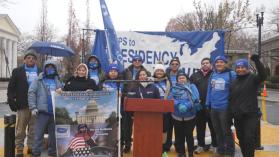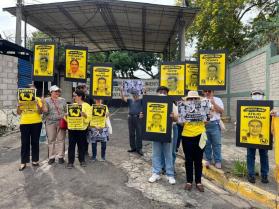Manipulation and Pressure Tactics win the CAFTA Referendum in Costa Rica
CISPES, the Stop-CAFTACoalition, and the Alliance for ResponsibleTrade organized a delegation to monitor the historic CAFTA referendum processin Costa Ricain October. Two CISPES activistsparticipated in the delegation, and brought energy from the Costa Rican people and their denouncement of the stolen results back to their local work. The following excerpt is from an article byTom Louden written in the aftermath of the referendum.
With the final polls predicting a resounding win for theopponents of the US-Central America Free Trade Agreement (CAFTA) in areferendum on October 7, the U.S.government and the business elite in Costa Rica pulled out all thestops. In spite of a law which explicitly prohibits all public discussion ofthe issues in the two days before the referendum, several TV stations rannews programs designed to instill fear in the population if they votedagainst CAFTA. One program featured a 1 ½ hour interview with President Arias,elaborating the multitude of negative consequences rejecting CAFTA would bring.Additionally, a high level Arias cabinet member filled the news programs withanalysis around the doom CostaRica would face if CAFTA were not ratified.
White House confirmsno renegotiations of the FTA
All of the threats coming from the U.S. governmentreceived wide coverage in the Costa Rican media. The one which had the mostimpact was a White House statement the day before the vote affirming that ifCAFTA were rejected there would be no re-negotiating a new treaty with Costa Rica.Given that the Bush administration is practically a lame duck government, andcant predict the actions of the next administration, there is no validity tothis statement. Nevertheless, it was effective in spreading and amplifying thewell rooted campaign of fear administered by President Arias and his team.
These fraudulent tactics helped turn a significant marginfor the NO campaign into a narrow victory for the pro-CAFTA forces. With over1.5 million votes cast (75% of the voting population), only about 50,000 votesgave the Yes campaign their victory (51.6% to 48.4%). A victory gainedthrough such deliberately orchestrated and blatant violation of Costa Ricanelectoral law that it provides grounds to declare the referendum null and void.But the Costa Rican Supreme Electoral Council failed to act in the moment, whenchallenged to do so, and continues to be silent, something which demands aquestioning of their impartiality and credibility as an independent body.
There were reports of grave violations in many locationsacross Costa Rica. While these are important, the central abusewas planned, organized and systematically carried out at a much higher level.The failure to act by the Supreme Electoral Council must be denounced and theirauthority challenged. From the time this propaganda blitz began, leaders fromthe NO campaign made formal demands to the Election Authorities that thepropaganda be stopped, or that the stations be shut down. Those demands werecompletely ignored. The neutrality which should be central to an authority ofthis nature was missing from the equation.
In response, the Alliancefor Responsible Trade and the Stop CAFTA Coalition mounted an internationalorganizational sign-on letter campaign to the Organization of American States(OAS), demanding that they declare the results of this referendum null andvoid. In the U.S.,we deeply understand the consequences of stolen elections. Given the complicitrole of our government in the corrupting the process, we owe it to the peopleof Costa Ricato demand their right to vote freely without foreign interference.
NO is better, thebattle continues
The elation of a people standing up for their rights whichwe witnessed at multiple polling places on Referendum Day has been replacedby dread and disillusionment. After the results were announced, people from theNO campaign were in shock. They didnt expect their estimated 55% lead wouldbe lost in the final days. Once the shock has passed, this dread turned intocoordinated and coherent action. For more than twenty years Costa Rica hassucceeded in resisting many of the prescribed economic reforms imposed by theNorth and international institutions, providing an alternative model ofdevelopment that has clearly worked. Costa Ricaand the world have too much to loose if this model of development is unraveledby the greed of the transnational companies and their client state, the U.S.

 "I am a CISPES supporter because continuing to fight for social justice and a more people-centered country means continuing the dream and sacrifice of thousands of my fellow Salvadorans who died for that vision.” - Padre Carlos, New York City
"I am a CISPES supporter because continuing to fight for social justice and a more people-centered country means continuing the dream and sacrifice of thousands of my fellow Salvadorans who died for that vision.” - Padre Carlos, New York City

